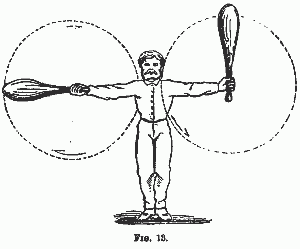Shoulders.
Some, no, most people think they are separate parts of the body.
Oh, how do I train my shoulders, they ask.
Or, my shoulder clicks and hurts when I do activity x.
Often they are simply referring to the glenohumeral joint.
They may go to see a doctor or a physio.
Do some theraband exercises, they may be told.
They do them religiously and it does get a little better.
But the problem with simply strength training a muscle in a two dimensional manner is that the body doesn’t actually work that way. It is far more complex than that.
The shoulder works three dimensionally. So even just training your rotator cuff muscles through internal and external rotation movements on their own will not address the issue. It will help but first let us take a closer look at the shoulder.
If we look at the glenohumeral joint, the shoulder is made up of the humerus (upper arm) and the scapula (shoulder blade). Nothing special about that. But even just by acknowledging that the shoulder is a joint not just a muscle, we now realise that anything that affects these two bones must affect the joint.
So looking beyond the 4 rotator cuffs, we come across other muscles like the levator scapulae, the trapezius muscles, latissimus dorsi and serratus anterior, even pec minor, biceps, brachialis, the rhomboids, triceps, coracobrachialis, deltoid, teres major and even the inferior part of omohyoid. But wait, there are also the flexors and extensors of the forearm. That is over 30 muscles all up. Now do you begin to appreciate the complexity of the shoulder?
So how are we supposed to train the shoulder then?
Not by just training the muscles separately. But together. Training them to coordinated movement of the actual shoulder joint.
This requires rather complex movements when we compare it to simple and commonly prescribed physical therapy exercises like internal/external rotation, wall slides, scapular plus pushups.
Even things like shoulder circles are more complex as they require control of the joint through greater ranges of motion. Not just simple movements, they are really combinations of movements which is why most people with and without shoulder injuries will hear their shoulders go clunk clunk clunk when they do them. Because they cannot actually control the motion of the shoulder joint accurately so that it was not moving efficiently. Imagine dodgem cars where every bump was a clunk rather than a clean run.
I had lecturers at university who would say the shoulder or rather the rotator cuff muscles were being overused and hence getting injured. I would disagree and say that the programming is what is lacking. So the best way to train the programming is gradually increasing the complexity of these movements until we end up with shoulder circles and combinations thereof.
Things like tai chi and qi gong movements that are not mere waving hands around.
 Things like club swinging or tool use practiced properly. Which is again not that common.
Things like club swinging or tool use practiced properly. Which is again not that common.
Things like pushups performed properly. Sadly, also not that common.
Even things like plank holds teach stabilisation.
Combination movements in closed chain movements, open chain movements and then open chain with resistance.
If this sounds different to what you are doing to bulletproof your shoulders, then this is probably why your shoulder hurts and goes clunk clunk clunk when you try to use it.
Shoulder joints are complex things and this is only the simple version I’ve given you here.
But if you want yours to be healthy, you need to look after them properly.



Word…most people are too preoccupied with how much they can move/lift rather than how well they can move. Learning to move in a integrated & coordinated way is not difficult and one of many plus sides it can be continuously progressed, whereas lifting weights can only be progressed to the point where you physically can’t lift more…or worse when something snaps. Be tireless. Kashi